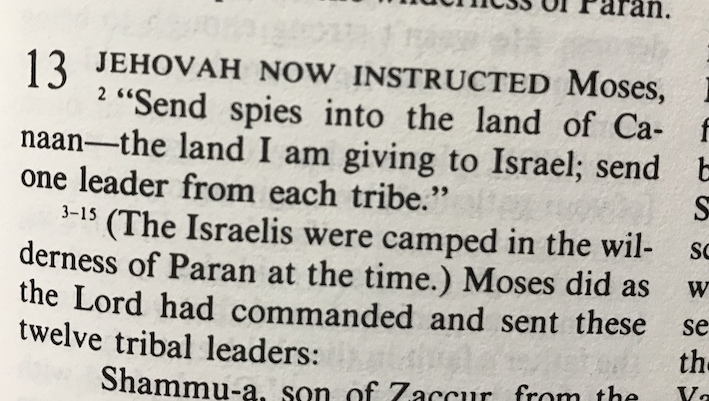I talk about trusting God a lot.
I mean a lot a lot 
I was talking to a friend last week about something and, of course, I was sharing about choosing to trust God. “Just like you say in your blog,” was the response I received.
Yep 
As I’ve shared before, I write what I know. I write what I’ve lived. I write what I’ve experienced, what God has shown me, or is showing me.
I don’t write about it if it hasn’t already begun to pulsate in my blood.
I write about this because I hear from people, at least on a weekly basis, that they don’t know how to trust God. I hear from people who have been Christians for decades that God is confronting them on the fact that they don’t really trust Him.
They may trust Him for salvation – but they do not trust Him with their daily lives. They don’t really trust Him for provision or healing or freedom or any of the other things they desire or need.
Why don’t we trust God?
There could be a million reasons. There may have been a time He didn’t come through. He didn’t heal a loved one. He didn’t give us that job we really wanted. He didn’t come through with that miracle.
He didn’t provide – or at least not in the way we wanted Him to.
Trusting in God isn’t just about trusting that He is going to do certain things for us as His adopted children, or that He will give us certain things because He loves us.
It’s about trusting in His character, that He is who He says He is and He will do what He has said He will do.
Ultimately, I think one of the main reasons we don’t trust God is because we don’t know Him. Yes, we have been adopted as His children through Jesus’ gift of salvation, but we don’t really know Him. We have unrealistic expectations of Him. Yes, God can do anything, even the impossible – according to His perfect will. Yet our method is to come up with a plan, and expect Him to bless it and carry it out in our timing.
“Many are the plans in a man’s heart, but it is the LORD’s purpose that prevails.” Proverbs 19:21
We need to grow to know His character, His attributes. We need to know His heart.
We cannot surrender our struggles to and grow to trust someone we don’t know. The primary ways we get to know God are through spending time in His Word and in prayer.
Let me pause and clarify. Lots of people (and I do mean lots) who have life-controlling issues (and especially relational brokenness issues) have been told that if they read the Bible and prayed more, their problems would go away. I’m not saying that at all. There is a reason that “Spending Time with the Freedom Giver” is only 1 of the Freedom Steps in my “Learning to Walk in Freedom” series. It’s only 1 step in the process, but it’s an important step.
BUT I think those of us who have been indoctrinated with this “try harder, do more” mentality of “read the bible and pray more” sometimes throw the baby out with the bath water, as the saying goes (um, and being a parent, what a strange saying!).
Since we’ve already “tried harder” and it didn’t “work”, we don’t invest the time & energy needed into having a regular, set aside time with God and His Word. I fell into this trap for a while. I continued to read some Christian literature, sometimes a devotional book, but I did not spend much time studying the Bible unless I was preparing to speak (kind of embarrassing to admit that!).
There was just so much baggage attached to the Bible for me. I had to get over that. I had to release that baggage and those misconceptions to God and recognize what I’d already experienced the truth of: when I read His Word consistently, I walk away changed.
Now I can’t live without the Word of God in my life.
If you feel lost in how to begin studying the Word of God, here are a few ways you could start digging in.
1. Start with a gospel. Matthew, Mark, Luke & John are the 4 gospels in the New Testament, 4 accounts of Jesus’ time on earth. They are all very different. Mark is a shorter book with rapid-fire description of what Jesus did here on earth. John is slightly longer, but it provides a fuller picture of the person of Jesus, with quite a few of His longer teachings and speeches, as well as an intimate look into His time with the disciples.


2. Get a study Bible. Ask a friend (or friends) what study Bible they use. Go to a book store and check a few out. Currently, I’m reading the “Life Recovery Bible” which is the New Living Translation and includes thoughts about recovery and the 12 steps. I generally read the NIV (I have a Serendipity Bible from my campus ministry days that has thought-provoking, and sometimes silly, questions to ponder) or the NASB, so I wanted to read something a little different.
One word of caution: even if you are using a study Bible, you don’t need to always be reading the little boxes and interpretations of the passage. You can simply read the Scriptures and work through them yourself (see #3 for some suggestions). If you tend to rely too heavily on other’s thoughts about the Bible or trust too much in others to interpret Scripture for you, you’re likely better off with an old-fashioned “pew Bible“.
3. Use a study method. When I was a student, I used the PROAPT method.
Pray: Begin your time of study by praying for God to open your eyes and your heart to what the passage might be speaking to you today.
Read: Read the passage you’ve chosen for the day.
Observe: Simply observe, by asking the questions how, who, why, where, what & when, what is going on in the passage. Who are the characters? What are they doing? Where are they? When is this happening? What are they feeling and experiencing?
Apply: Apply the passage to your life. What might this passage have to teach me today?
Pray: Pray again that God would make what you have read have His life breathed into it.
Tell: Tell someone about what you have learned in your Bible reading today.
Another similar resource is often referred to as “the Navigators Word Hand“. The “Word Hand” shows five methods of learning from the Bible: Hear, Read, Study, Memorize, Meditate.
A friend of mine likes to take Scripture and put it in his own words by writing his thoughts out in his journal.
4. Think outside the box. Your “quiet time”, as it’s often called, does not need to look the same every day. Mine doesn’t. Ask God to help you figure out what works best for you. Be creative. Gary Thomas’ book, Sacred Pathways , has some great suggestions.
, has some great suggestions.
There are lots of options.
Next week, I will share more on this topic  See you then!
See you then!









 , has some great suggestions.
, has some great suggestions.